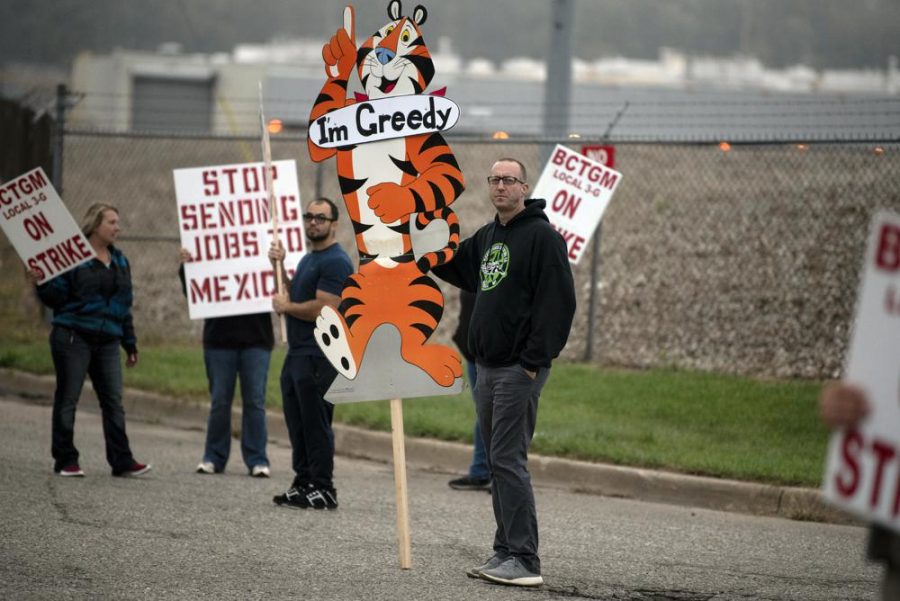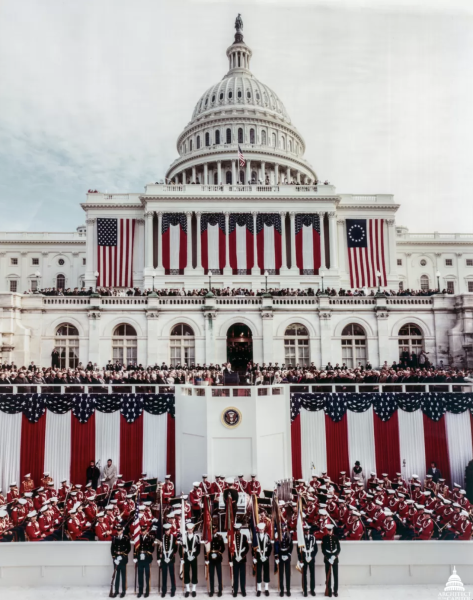Unions across the country strike
Photo Courtesy / Alyssa Keown, Battle Creek Enquirer
The US has experienced a labor shortage since the beginning of the COVID-19 pandemic.
What do cereal, tractors, healthcare, and your favorite Netflix original series all have in common? Well, they all may be difficult to access in the coming weeks due in part to ongoing and impending workers’ union strikes all over the country.
Dubbed “Striketober” by internet users, the last month has seen nearly record-breaking numbers of labor union strikes throughout the United States. Labor (or trade) unions are nationally and locally organized groups of workers that unite to advocate for workers’ rights and interests within the companies that they work for. In some states, right-to-work laws allow workers to join unions in various industries across all sectors. For example, in Texas, a right-to-work state, numerous labor unions have been established for autoworkers, engineers, transit workers, and teachers among many other professions.
The first of these strikes began at the start of the month at Kellogg cereal plants, where production was halted as workers protested issues such as health care, vacation time, and most notably the company’s adoption of a two-tier wage system. Across the country, workers in other industries share similar grievances with their employers, particularly against the adoption of two-tier wage systems.
The two-tier system was widely adopted in the American manufacturing industry after the Great Recession as many corporations used it to make up for the loss of profit. It reduces wages and benefits for employees hired after a set date, leaving those who were hired before then with higher wages and more benefits. Those working in manufacturing argue that this can create significant wage gaps among workers doing the exact same job, fueling conflict among personnel and complicating workers’ union efforts to act in the interest of their members.
Since Oct. 5, over 1,000 workers at Kellogg’s cereal plants in Michigan, Tennessee, Pennsylvania, and Nebraska have been on strike, protesting 12-hour workdays, mandatory overtimes, and the proposed two-tier wage system for employees. Those on strike against this new contract feel that the company has made enough profit over the last year, with the increase in demand for cereal, to adequately pay and compensate all employees with appropriate benefits, regardless of time of employment.
“The level we were working at is unsustainable,” President of the Kellogg strikers, Daniel Osborn said.
In Illinois, Iowa, Kansas, Colorado, and Georgia, over 10,000 John Deere manufacturing employees went on strike on Oct. 14 against another two-tier system, also reducing benefits for new employees. This plan was proposed in a new contract by the company that was rejected by the United Auto Workers, of which many John Deere employees are members.
“Pickets have been set up and our members are organized and ready to hold out and fight for a contract they believe meets their needs,” Director of UAW Region 4, Ron McInroy, said in a statement on the UAW website.
The resulting stagnation in the production of farm equipment could have a devastating impact on the agriculture industry as many small farmers rely on John Deere for equipment, parts, and equipment maintenance.
“We have a lot of big equipment out here that we’re using to bring in a harvest, and if a part breaks down that we can’t get, we’re done,” President of the Iowa Corn Growers Association board, Lance Lillibridge, said to the Associated Press.
On the other side of the country, film and TV crews claim that recent increased demand for streaming content and the requirements in their contracts has led them to be required to work longer hours and miss out on essential breaks. Due to these conditions, the International Alliance of Theatrical Stage Employees (IATSE) set a deadline for Oct.18 to come to an agreement with the Alliance of Motion Picture and Television Producers (AMPTP) on a new contract.
“It’s really led workers to a breaking point. I mean, reports [were] coming in all over the place that conditions have deteriorated,” Director of Communications for IATSE, Jonas Loeb, told NPR.
If no deal was made, IATSE and its members scheduled the strike for that very day with 60,000 backstage workers, halting film and television production for the entire country. Then, on Oct. 16, a last-minute deal was reached between the IATSE and the IATSE. Although members of the IATSE have yet to approve the conditions of the agreement, the strike was called off.
“This is a Hollywood ending,” President of the IATSE, Matthew Loeb, said in an emailed statement to Reuters. “Our members stood firm. They’re tough and united.”
Nearby, at Kaiser Permanente healthcare facilities in Southern California and Oregon, over 20,000 healthcare workers authorized an impending strike on Oct. 12 against another proposed two-tier wage system. This outrage, from healthcare workers represented by the Alliance of Health Care Unions, comes considering the recent pandemic and the physical and mental strain that it had put on those in the profession.
“Especially after the last 18 months, it leaves me with a bad taste in my mouth,” Kaiser occupational therapist, Alaa Abou-Arab, told NPR.
As of Oct. 20, Kaiser and the Alliance of Health Care Unions continue negotiating contract details to come to an agreement in hopes of averting the strike and putting patients at risk. The Kellogg and John Deere strikes are still ongoing and the new contract for film and TV crews has yet to be ratified by IATSE members.











